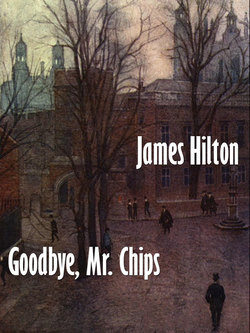Читать книгу Good-bye, Mr. Chips - James Hilton - Страница 4
ОглавлениеCHAPTER 2
Across the road behind a rampart of ancient elms lay Brookfield, russet under its autumn mantle of creeper. A group of eighteenth-century buildings centred upon a quadrangle, and there were acres of playing fields beyond; then came the small dependent village and the open fen country. Brookfield, as Wetherby had said, was an old foundation; established in the reign of Elizabeth, as a grammar school, it might, with better luck, have become as famous as Harrow. Its luck, however, had been not so good; the School went up and down, dwindling almost to non-existence at one time, becoming almost illustrious at another. It was during one of these latter periods, in the reign of the first George, that the main structure had been rebuilt and large additions made. Later, after the Napoleonic Wars and until mid-Victorian days, the School declined again, both in numbers and in repute. Wetherby, who came in 1840, restored its fortunes somewhat; but its subsequent history never raised it to front-rank status. It was, nevertheless, a good school of the second rank. Several notable families supported it; it supplied fair samples of the history-making men of the age—judges, members of parliament, colonial administrators, a few peers and bishops. Mostly, however, it turned out merchants, manufacturers, and professional men, with a good sprinkling of country squires and parsons. It was the sort of school which, when mentioned, would sometimes make snobbish people confess that they rather thought they had heard of it.
But if it had not been this sort of school it would probably not have taken Chips. For Chips, in any social or academic sense, was just as respectable, but no more brilliant, than Brookfield itself.
It had taken him some time to realize this, at the beginning. Not that he was boastful or conceited, but he had been, in his early twenties, as ambitious as most other young men at such an age. His dream had been to get a headship eventually, or at any rate a senior mastership in a really first-class school; it was only gradually, after repeated trials and failures, that he realized the inadequacy of his qualifications. His degree, for instance, was not particularly good, and his discipline, though good enough and improving, was not absolutely reliable under all conditions. He had no private means and no family connections of any importance. About 1880, after he had been at Brookfield a decade, he began to recognize that the odds were heavily against his being able to better himself by moving elsewhere; but about that time, also, the possibility of staying where he was began to fill a comfortable niche in his mind. At forty, he was rooted, settled, and quite happy. At fifty, he was the doyen of the staff. At sixty, under a new and youthful Head, he was Brookfield—the guest of honor at Old Brookfeldian dinners, the court of appeal in all matters affecting Brookfield history and traditions. And in 1913, when he turned sixty-five, he retired, was presented with a check and a writing desk and a clock, and went across the road to live at Mrs. Wickett’s. A decent career, decently closed; three cheers for old Chips, they all shouted, at that uproarious end-of-term dinner. Three cheers, indeed; but there was more to come, an unguessed epilogue, an encore played to a tragic audience.
